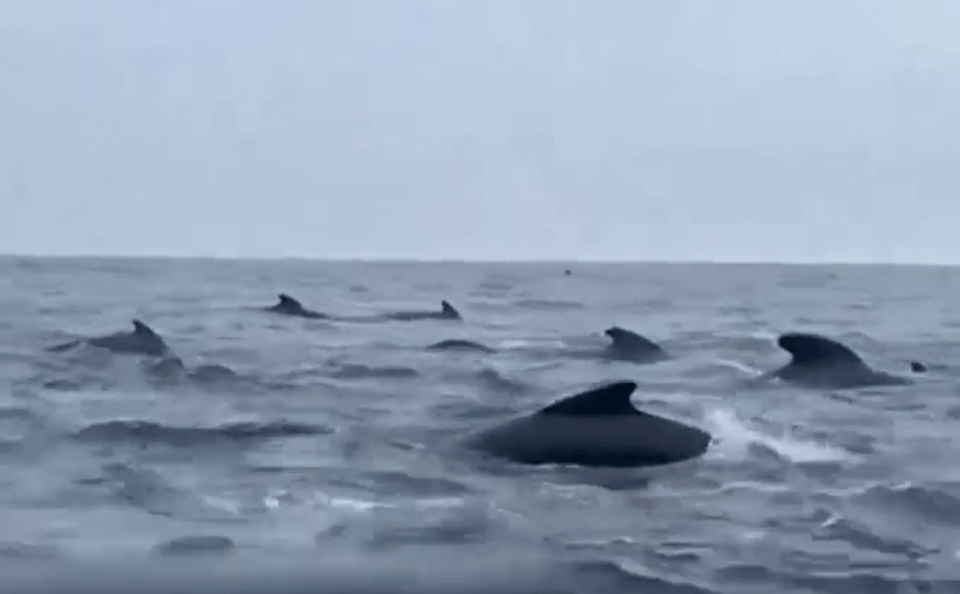WATCH the nerve-wracking moment a Brit rower was surrounded by a huge pod of whales before one slammed into the side.
Tom Waddington filmed the pod of whales blowing bubbles and rocking the boat as they played around him, some 100 nautical miles off the coast of Newfoundland, Canada on Sunday.
ReutersA pod of 1000 whales were filmed swarming a solo UK rower[/caption]
ReutersTom Waddington filmed the incredible moment[/caption]
ReutersThe UK based ski coach is raising money for mental health charity Mind[/caption]
The UK based ski coach, is on a solo rowing journey across the Atlantic Ocean to raise money for mental health charity Mind.
He posted the encounter on to his Instagram account which as garnered more than 76,000 views online.
Waddington estimated that there were more than 1,000 long-finned pilot whales in the pod.
In the video posted to Instagram, he said: “What a special treat.
“I love it, but I’m scared they’re gonna hit the rudder.”
However soon after, a curious whale slammed into the side of his boat, leaving him shaken.
Thankfully, the rudder was intact.
He said: “I can’t believe it.
“It’s an amazing sight but also so scary.”
It took the rower two hours to navigate the whale infested waters, and the excitable whales eventually left him alone.
Long-finned pilot whales are very social in nature.
They are usually seen in groups, which range in size from a couple of individuals to aggregations of over a thousand.
While not common, there have been hundreds of documented cases of whales smashing into sides of boats.
Recently an Orca task force was tracking a pod of ruthless whales who were smashing yachts off the coast of Gibraltar.
Rogue killer whales have been attacking seafarers and sinking vessels in the Strait of Gibraltar for at least three years now.
A pod of orcas pummeled the 50ft Alboran Cognac with two people onboard.
Passengers onboard the vessel said they felt sudden blows to the hull before it started sinking in the Moroccan waters.
They were rescued by a nearby oil tanker which dropped them to Gibraltar after receiving emergency alerts.
The 50ft yacht was left abandoned before it sank completely.
Orca attacks on boats travelling through the Strait of Gibraltar – also known as Orca Alley – were first reported in 2020.
These ambushes, which range from orcas simply approaching boats to actively interfering with them, have repeatedly occurred in the stretch of water between Spain and Morocco.
A nature conservation group called the Atlantic Orca Task Force (GTOA) has been tracking these killer whales attacking the vessels.
The organisation reported a 298% rise in orca-boat interactions with 673 such cases recorded between 2020 and 2024.
Another incident took place in August when a boat full of panicked tourists was attacked by a pod of killer whales.
Footage showed the horrified holidaymakers surrounded by several orcas just off the coast of Sesimbra, Portugal.
Last year, Brit couple Janet Morris, 58, and Stephen Bidwell, 58, from Cambridge, were involved in a whale attack that lasted for an hour.
On May 2, around six orcas reportedly rammed the hull of the Bavaria 46 cruiser yacht they were travelling on, on the Strait of Gibraltar.
Janet and Stephen were stunned when they were alerted with the cry of “orcas!”
Stephen told The Telegraph: “It was an experience I will never forget.
“I kept reminding myself we had a 22-ton boat made of steel, but seeing three of them coming at once, quickly and at pace with their fins out of the water was daunting.”
Janet added: “We were sitting ducks.”
“A clearly larger matriarch was definitely around and was almost supervising,” Stephen added, furthering speculation that it was White Gladis.
Why are orcas attacking boats?
WHILE researchers are unsure exactly why killer whales have been attacking boats in the strait, many theories have been put forward.
Some experts suggest it could be a playful manifestation of the animals’ curiosity.
But others fear a “critical moment of agony” such as a collision may have sparked aggression towards boats.
Alfredo López Fernandez, a biologist at the University of Aveiro in Portugal, told LiveScience: “That traumatized orca is the one that started this behaviour of physical contact with the boat.”
Some even speculate White Gladis may now be spurring fellow killer whales on.
Orcas are the largest members of the oceanic dolphin family.
Although they never attack humans, the apex predators can take down large groups of whales, hence the name killer.
What makes them a unique marine mammal is that they often hunt in lethal pods and family groups of up to 40 individuals – and feast on fish, dolphins, seal lions, seals, sharks and stingrays.
The carnivores can grow up to 32feet long and weigh up to six tons – and are immediately recognizable by their distinctive black-and-white colouring.
ReutersWhile Waddington loved it, it was nerve wracking when a whale smashed into the side of the boat[/caption]
ReutersThe encounter happened 1000 nautical miles off the coast of St John, Newfoundland[/caption]
ReutersIt took the rower two hours to navigate the whale infested waters,[/caption]
ReutersWaddington estimated that there were more than 1,000 long-finned pilot whales in the pod.[/caption]

